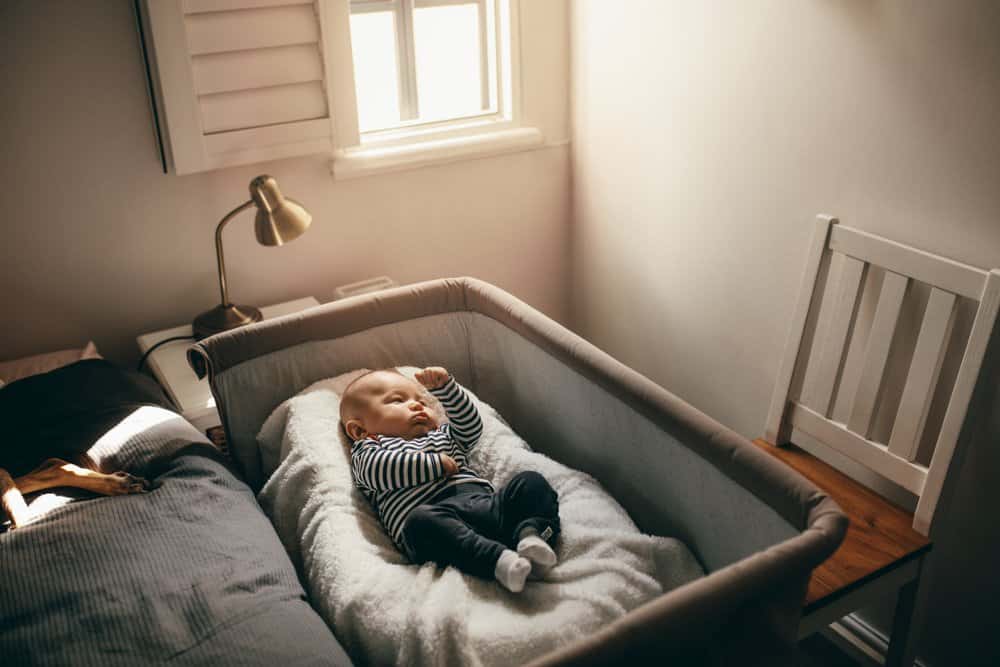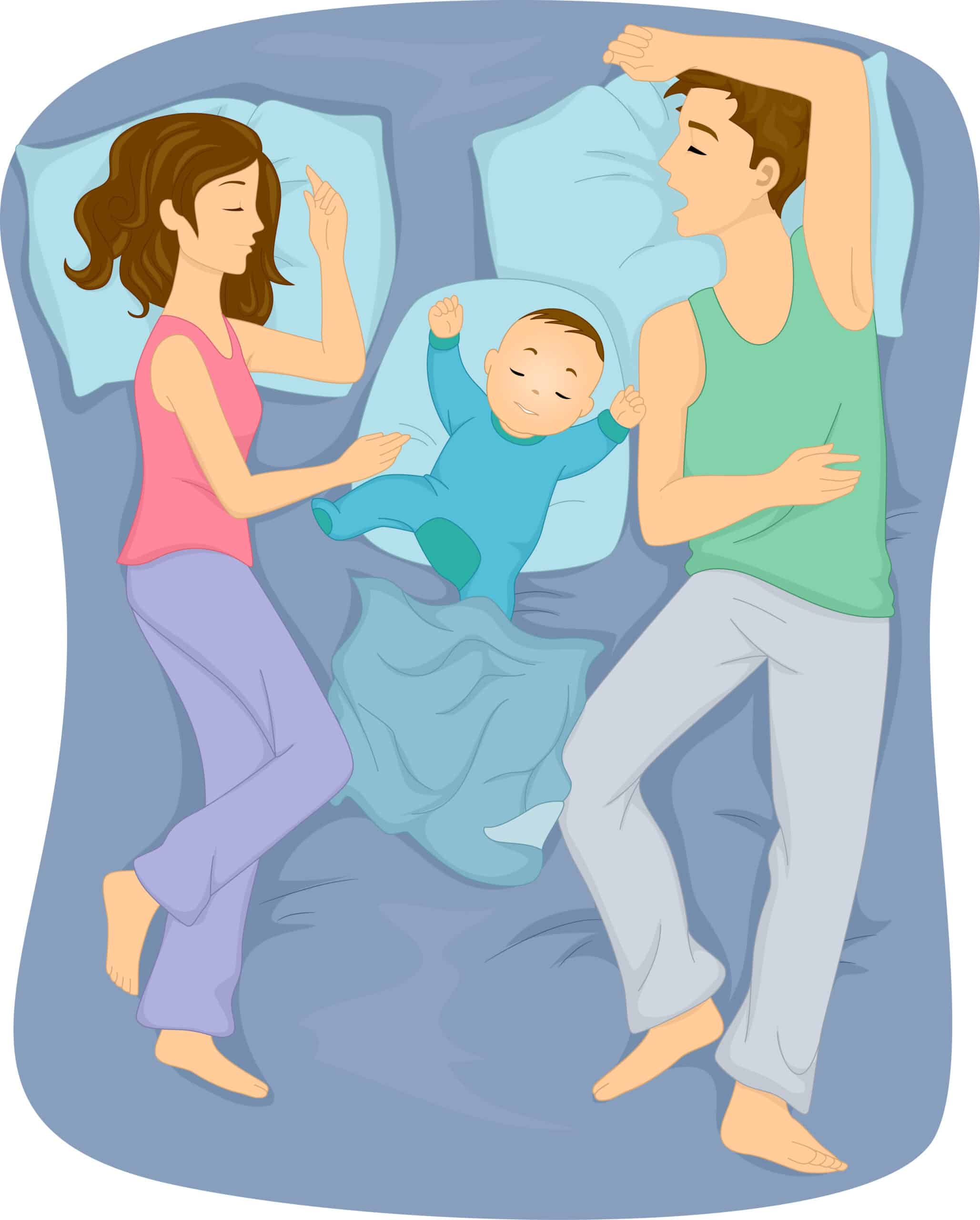If you need the ultimate guide to co-sleeping with your little one, you have come to the right place. In this guide, we’ll dive into what co-sleeping is, if it’s safe to co-sleep with your baby, and our tips for how to make sure your little one is safe throughout the night.
- What Is Co-Sleeping?
- One Form of Co-Sleeping – To Be(d-Share) or Not to Be(d-Share)?
- How Exactly Am I Supposed to Co-Sleep With My Baby When They Are in a Cot or Bassinet?
- Benefits of Co-Sleeping (Specifically Room-Sharing)
- Till What Age Should My Baby Co-Sleep?
- What if I Have to Bed-Share?
- Will Co-Sleeping With My Baby Make Them Too Dependent on Me?
- Parting Thoughts
What Is Co-Sleeping?
Even this question can lead to some disagreement, but let’s clear the air once and for all, shall we?
Co-sleeping refers to the practice of sleeping in the vicinity of your baby (think of your baby as your mini roommate with similar genes).
Therefore, co-sleeping can happen in the following two ways:
- Your baby is sleeping with you on the same bed. This is called bed-sharing.
- Your baby is sleeping in the same room but not on the same bed. This means they would be sleeping on a cot, bassinet, or crib near your bed. This is called room-sharing.
We’ll look at all these forms of co-sleeping in detail.
According to The American Academy of Pediatrics (AAP), bed-sharing is not safe for the infant. It is one of the predominant factors leading to Sudden Infant Death Syndrome (SIDS).
Why Should I Avoid Co-Sleeping?
Being surrounded with too many blankets, pillows (and humans!) can lead to babies ending up in dangerous sleeping positions, getting crushed, suffocated, or trapped among the many things and people on the bed. Adult bedding, which is often soft and loose, is a potential choking hazard as well.
Bed-sharing is especially not recommended for parents who are heavy sleepers. All of us know of at least that one time a new parent passed out of pure exhaustion and slept like a log, don’t we? This also applies to parents who might use sleep-inducing medication. Why? Heavy sleepers will be less aware of their movements while sleeping, which means they might roll on top of the baby or even push the baby off the bed.
All of these can lead to SIDS. If you are a parent who regularly smokes, drinks, or uses drugs, sharing a bed with your little one can increase the chances of SIDS even more.
Therefore, if the answers to the following questions are a yes, it is advisable not to share your bed with your baby:
- Are you a current smoker, even if you don’t smoke in bed?
- Do you go to sleep excessively tired or have extremely heavy sleep?
- Do you consume drugs or alcohol? This question is essential to gauge your mental alertness, so consider your usage of sleep-inducing medication too.
We totally get it – you want to spend every moment with the apple of your eye in your arms, either out of love or worry, so this might not be the news you are looking for.
But no matter how much you want to snuggle with your angel during nighttime, for their safety, do not share your bed with them. Instead, adopt the other form of co-sleeping: Room-sharing. Often, in pointing out the cons of bed-sharing, parents end up dismissing co-sleeping altogether. However, that need not be the case. Room-sharing is not only safe but can also be super beneficial for your baby, if done correctly, of course.
Can My Children Co-Sleep Together?
What if you have more than one baby and want all of them to share beds? Is that a good idea?
No, your babies should not be sharing their sleeping surface with ANYONE. Their cot or bassinet needs to be their own space, without any object or human (however small and cute that human might be) in the way. Babies should not share their cots with other babies, just like adults should not share their beds with babies.
But does that mean your babies can at least room-share? Well, yes, they can. But you also need to be in that room because leaving your babies in the night without adult supervision means no one will be around to intervene if something happens.
How Exactly Am I Supposed to Co-Sleep With My Baby When They Are in a Cot or Bassinet?

Over the years, doctors have supported the ABC method for a baby’s nap time:
- A: Alone, which means in the same room but not the same bed
- B: on their Back
- C: In a Crib (or bassinet)
The crib should be of high quality and should not have any loose sheets, pillows, or toys in it while the baby is using it to sleep. The surface should be absolutely flat with no extra cushioned areas. Want help figuring out which crib to buy? Here’s a buyer guide to help you out!
Your baby needs to have their own space, preferably in a firm crib/bassinet. They should sleep on their back, rather than on the side or on the stomach. And their face should be uncovered to avoid suffocation or overheating.
Newer bassinets on the market allow you to push it so close to your bed that your baby is within your reach but in their own little bed. Only mattresses made for babies should be put in the crib. The crib should not be near any other potential hazards such as dangling wires, railings, etc., that can hurt the baby or lead to strangulation.
Never make your baby sleep on a couch, sofa or futon, or any other surface! If your phone can bounce off these surfaces or slip into their crevices, so can your baby!
Want all this information in an infomercial format with graphics? Here you go!
Benefits of Co-Sleeping (Specifically Room-Sharing)
The most significant advantage of co-sleeping using a cot for your baby is that the probability of SIDS flowing from unsafe sleeping practices gets reduced, almost by 50%. Therefore all the dangers of bed-sharing, such as strangulation, entrapment, or suffocation, are unlikely to happen. But there are other benefits as well!
So what if we tell you that you can get the benefits of bed-sharing without its disadvantages by room-sharing instead? Let’s look at the benefits of room-sharing, without all the danger that comes along with bed-sharing:
It Regulates Their System
When you and your baby are room-sharing, their breathing, heart rate, oxygen levels, and temperatures function in tandem with yours, thus regulating their systems. Sleeping far away can lead to higher levels of stress for the baby.
It Helps You Get More Rest
When your baby is in a bassinet close to you, you won’t have to get off the bed to feed them or check on them in the middle of the night. Breastfeeding becomes easier. This means you are likely to be a bit more rested than if you had to go to a separate room to check on them or feed them throughout the night.
We don’t have to tell you even an extra hour of sleep as a new parent can do wonders for your mood and health!
Your Baby Will Sleep Better
Your baby will sleep better, as well! If you are room-sharing, you can get to the baby to calm them down or feed them before they are fully awake, leading to fewer disturbances in the baby’s sleep.
You Don’t Have to Worry About Harming Your Baby
Despite being this close to the baby, you don’t have to be worried about your movements or even tangled blankets harming your baby.
You Can Monitor Your Baby All Night
You can keep an eye on your baby at all times!
Till What Age Should My Baby Co-Sleep?
While there is no time limit based on scientific reasons, AAP recommends that you stop room-sharing when your baby turns one. The reason is simple enough – once your child turns one, the chances of them crawling onto your bed shoot up, thus exposing them to risks of suffocation and entanglement described earlier.
However, when to stop co-sleeping is more of a cultural question depending on your family dynamics and personal preferences.
Questions you can consider while deciding if it is time for your baby to stop co-sleeping include:
- How has the baby’s sleep been with the current arrangement?
- Does the baby end up crawling next to you at some point in the night?
- Even with the child room-sharing, is it difficult for you or your partner to wake up when your baby needs you?
Depending on your particular situation and your answers to the above questions, you can choose one of the following:
- Stop co-sleeping once your baby becomes just too big for a bassinet,
- Stop co-sleeping once they turn one year old,
- If you and your baby are comfortable with co-sleeping, then just go for it for as long as you want!
However, just remember, co-sharing is ESSENTIAL in your baby’s first six months. The chances of your baby suffering from SIDS is highest during this time frame, so they should not be sleeping alone in a room.

Suppose you absolutely cannot let your baby sleep on a separate surface due to space constraints or any other issues. In that case, you must take ALL the precautions possible to make bed-sharing as safe as possible for your little one.
Most of all, everyone sleeping in the bed, whether it be your partner or some other person, as well as you, should be aware and feel comfortable about having a baby in the bed. Everyone sharing the bed with an infant also shares the responsibility of taking care of them while sleeping in the same bed.
Some precautions you can take while bed-sharing:
- Avoid practices such as rolling a lot or placing too many pillows and blankets on the bed.
- Do not forget to put all your electronics such as phones, chargers, and other possible choking hazards far away from the bed.
- Do not put the baby on a pillow. Their sleep surface should be firm. Invest in a harder mattress if need be.
- If it’s just you and the baby, the bed should be right next to a wall so that the baby cannot fall off the bed.
- If you have long hair, tie it up so that it doesn’t become a choking hazard for the baby.
You can also go through this useful animated video that gives accurate visuals of how to go about these precautions. Following the correct techniques during bed-sharing, especially sleeping positions for you and your baby, is crucial.
Will Co-Sleeping With My Baby Make Them Too Dependent on Me?
Scientifically, no. There are no studies that prove that co-sleeping stops babies from growing into independent children. There is absolutely no proof of any psychological harm arising out of co-sleeping. The only argument that can be made is against UNSAFE co-sleeping, so if you keep all the guidelines in mind, you will be fine.
So, if your relatives are giving you a hard time for letting your baby sleep next to you on a bassinet…
Or are trying to convince you that your baby will always be attached to you because of sleeping next to you…Just ignore them like you ignore ads on YouTube!
Parting Thoughts
Co-sleeping is often a hotly debated topic among parents. With conflicting advice online, you might choose not to be open about your baby’s sleeping arrangement. Remember to keep your pediatrician in the loop and keep track of your baby’s sleep as they get older. All the information here is an excellent starting point for everything you should keep in mind before deciding.
Having said that, your personal circumstances and home environment are the clinching factors that will determine where your baby sleeps. If you want to give co-sleeping a chance and have the means to bring in a cot next to your bed, you should definitely opt for room-sharing rather than bed-sharing.
If you follow all the safety guidelines, whether it be for the kind of bassinet you should buy or what to do if you have to bed-share, your baby should be able to have some safe Z’s.
Make safe co-sleeping practices a norm in your house, and watch all the benefits come to life!
